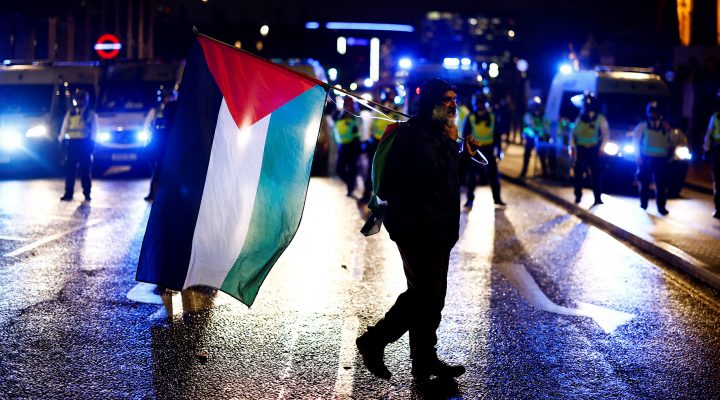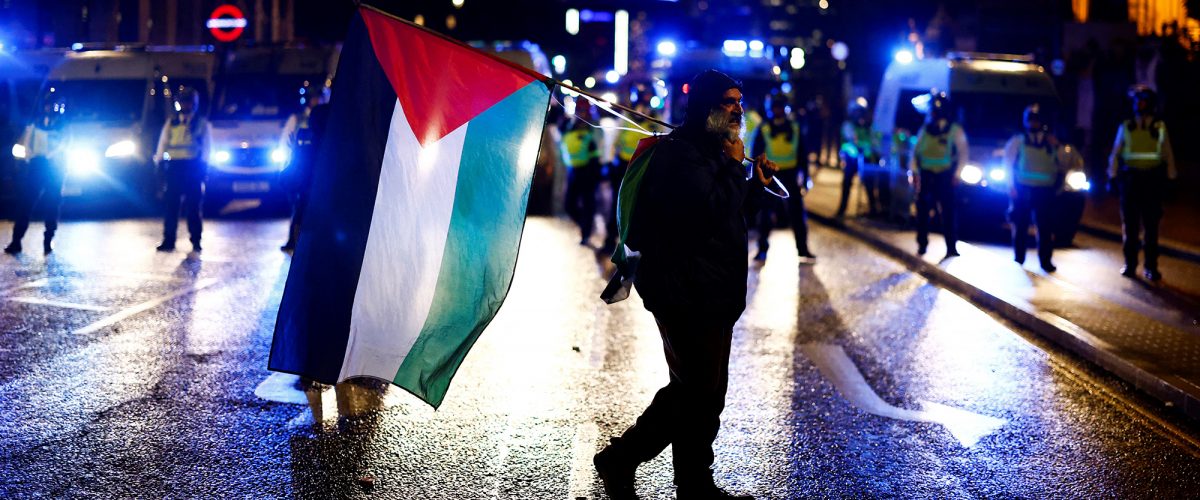After the International Criminal Court recently issued arrest warrants for Israeli Prime Minister Benjamin Netanyahu as well as Hamas leader Yahya Sinwar for their crimes against humanity, it is becoming clearer that the war between Israel and Hamas since the Oct. 7 attacks has reached genocidal levels with no end in sight.
Each of these parties has explicitly used religious frames to fuel the fire.

Aria Razfar
Pro-Palestinian student protests and encampments across the nation point to a shift in framing of the Israel/Hamas war within a religious historical context. The leaders of Northwestern and Rutgers universities as well as the University of California-Los Angeles are set to testify before a U.S. Congressional committee concerning allegations of antisemitism.
At scores of campuses across the country, protests against the Israeli attacks on Gaza have resulted in violence, arrests, graduation cancellations, student protesters banned from graduation and evicted from campus housing. The graduations that are not cancelled are marked with students walking the stage with religious and national symbols such as Palestinian scarves, Muslim hijabs and keffiyehs, while others wave the Star of David and the Israeli flag.
At the University of Illinois, the tents have come down but students continue with calls for divestment from Israel. The encampments also have been sites for interreligious community building from collective singing of the Passover Haggadah to breaking Ramadan fast at sunset.
While Israel’s invasion of Rafah continues, missiles recently lit up the sky of Jerusalem on the eve of Sabbath’s end, while evangelical Christian Zionists everywhere began sounding the chorus of end times prophecies and the eminent return of the Messiah.
Meanwhile, the axis of resistance was signaling that the liberation of Jerusalem was near with the return of Islam’s world savior, the Mahdi. The apparent Israeli response to an attack from Iran in the city of Isfahan for many demonstrated more end times eschatology and the final battle between good and evil.
When this began more than six months ago, Oct. 7 was supposed to be a day of rest, or shabbat, a day of celebration for completing the reading of the Torah, or Simchat Torah, and the culmination of thanksgiving festivities, or Sukkot.

Graphic created by United Nations
Instead, it became a day of unimaginable and historic horror for thousands of innocent Jewish-Israeli families. And now, the U.N. reports nearly 13,000 women and children are among the 35,000 Palestinians killed in Gaza.
While the Simchat Torah, Shabbat and Sukkot attacks may have been surprising to many in terms of timing, scope and scale, it was not surprising to many people living in the region, particularly those familiar with the religious aspect and history of this conflict.
This recalls the Yom Kippur Day of Atonement war of 1973, or since 1987 the first, second and Al-Quds Intifadas, or The Holy Jerusalem Uprising.
“Religion is a powerful tool that can lead to both heroic and heinous actions.”
My research on narrative testimonies as well as the interaction of religion, mass atrocities and genocide in other contexts shows religion is a powerful tool that can lead to both heroic and heinous actions.
The war between Hamas and Israel is in part a religious conflict. Understanding that can perhaps help to find a way out of the cycle of heinous atrocities.
It is noteworthy that many leaders from a Muslim majority or Arab nation did not condemn the vicious Oct. 7 attack on the innocent without simultaneously expressing solidarity with the Palestinian cause by referencing grievances from the last 70 years.
As Jews worldwide recently observed Passover, a day of liberation from religious bondage, the families of hostages held in captivity drew on religion to demand freedom. Meanwhile, during the final days of Ramadan, despite all risks, Palestinian Muslims from the West Bank descended upon the Al-Aqsa compound in Jerusalem to pray for peace.
The Vatican, the nucleus of the Roman Catholic Church, has been criticized by Israel for its calls for cease-fire and a release of hostages. Against the backdrop of Easter Sunday, Pope Francis called the conflict a “genocide” and appealed for peace.
Legal definitions aside, from the point of view of the religious texts of each of these Abrahamic faiths, the death of even one innocent person constitutes a genocide. As the Quran, referencing the Babylonian Talmud, states, “We decreed upon the Children of Israel that whoever kills a soul unless for a soul or for corruption (done) in the land — it is as if he had slain mankind entirely. And whoever saves one — it is as if he had saved mankind entirely.”
“From the point of view of the religious texts of each of these Abrahamic faiths, the death of even one innocent person constitutes a genocide.”
In a conflict where claims to land are derived from biblical promises, examining a more inclusive religious framing suggests the God of the Torah, Gospels and Quran has promised the land from the Nile to the Euphrates to all the children of Abraham (Genesis 15:18; Quran 2:124).
According to the Abrahamic Scriptures, the promise of God comes with only one condition. It is a condition not based on blood nor will it be realized through blood spilling. It is a promise based on the condition of righteousness and upholding the highest Abrahamic ethic of loving one’s neighbor, the stranger, the foreigner and the refugee as themselves.
This is the Golden Rule of Judaism, Christianity and Islam (Leviticus 19:18; Matthew 7:12; Luke 6:31; Quran 22:41). It is not a promise to those who create refugees, discriminate against the foreigner and shun the stranger. It is Allah’s, Ha-Shem’s and God’s promise that all the borders from the Nile to the Euphrates will dissolve as a result of a collective, transcendent consciousness.
While the hope is that this chapter of the conflict will end soon, the traumatic effects will remain. It can become a clarion call to transcend man-made religious or secular borders, create a new heroic narrative, and bring transformative religious or spiritual literacy that prioritizes humanity and dignity for all.
Aria Razfar serves as professor of education and linguistics at the University of Illinois Chicago. He is a Public Voices Fellow of the University of Illinois through The OpEd Project.
Related articles:
In this war, there are no ‘good guys’ | Opinion by Mark Wingfield
Yes, ‘Palestine’ is a place despite what Facebook memes may have told you | Analysis by Rodney Kennedy


